Positions & Papers
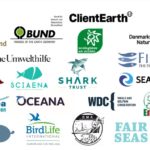
Recommendations to the EU on the setting of fishing opportunities for 2024
September 15, 2023
The 19 NGO signatories of this document wish to present our recommendations on the setting of fishing opportunities for 2024, including for stocks managed by the European Union (EU) alone and stocks shared with third countries like the United Kingdom (UK) and Norway. Read the recommendations here.
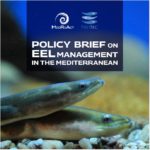
Policy Brief on eel management in the Med
September 1, 2023
Europe’s eel population has declined dramatically since the 1960-1979 reference period and recruitment is now very low. The Mediterranean region has been moving ahead in recent years, adopting the most progressive eel management measures. However, additional conservation measures are still needed to support the recovery of this critically endangered species for the future of eels and fishers. In this joint Policy Brief by MedReAct and FishSec, we give an overview of the eel management framework and eel management in the Mediterranean as well as the need for further recovery measures.
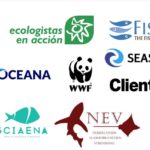
Joint NGO feedback to the European Commission on the “Sustainable fishing in the EU: state of play and orientations for 2024”
August 4, 2023
Joint response to the European Commission's public consultation on the progress towards achieving more sustainable fisheries, the state of fish stocks and the setting of fishing opportunities (initiative Sustainable fishing in the EU: state of play and orientations for 2024) by BirdLife International, Blue Marine Foundation, ClientEarth, Dutch Elasmobranch Society, Ecologistas en Acción, Fair Seas Ireland, Oceana, Sciaena, Seas At Risk, The Fisheries Secretariat, and WWF.
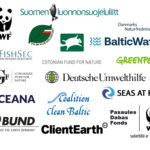
Joint NGO recommendations on Baltic Sea fishing opportunities for 2024
June 19, 2023
The Baltic Sea ecosystem is in severe distress and the major commercial fish stocks have never been in worse condition. In October 2023, EU fisheries ministers will agree on fishing opportunities in the Baltic Sea for 2024. We have provided joint NGO recommendations on Baltic Sea fishing opportunities for 2024 in the context of environmental regulations, EU fisheries legislation, scientific advice on catch limits, and the sharing of stocks with third countries. Read the NGO briefing here.
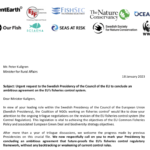
NGOs urgent request to the Swedish Presidency on the EU’s fisheries control system
January 20, 2023
ClientEarth, the Environmental Justice Foundation, Oceana, Our Fish, Sciaena, Seas at Risk, the Swedish Society for Nature Conservation, The Fisheries Secretariat, The Nature Conservancy, and WWF have sent a letter to Swedish Minister for Rural Affairs, Peter Kullgren, asking them to ensure trilogue discussions conclude with an ambitious agreement that future-proofs the EU’s fisheries control regulatory framework, without any backtracking or weakening of current control rules. We call on the Swedish Presidency to:
- Ensure that all quantities of each fish species caught are recorded, without expanding the margin of error allowed (the margin of tolerance) when fishing operators estimate their catches.
- Ensure full digital traceability of all fish and seafood products entering the EU supply chain without exemptions, including processed and preserved products.
- Extend mandatory vessel tracking systems for all fishing vessels.
- Make the installation of remote electronic monitoring (REM) systems – in particular CCTV cameras – mandatory on all fishing vessels over 12 metres in length and on those under 12 metres that are deemed either at risk of breaching the rules of the Regulation or likely to be complicit in the bycatch of sensitive species.
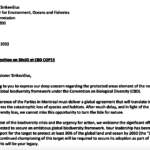
Letter to the EU Commission regarding the EU position on 30×30 at CBD COP15
December 13, 2022
Joint NGO letter to Commissioner Sinkevičius to express deep concerns regarding the protected areas element of the negotiations to
agree a new global biodiversity framework under the Convention on Biological Diversity (CBD).
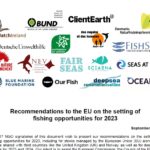
Joint NGO recommendations to the EU on the setting of fishing opportunities for 2023
September 16, 2022
The 17 NGO signatories of this document wish to present recommendations on the setting of fishing opportunities for 2023, including for stocks managed by the European Union (EU) alone and stocks shared with third countries like the United Kingdom (UK) and Norway, as well as for deep-sea stocks for 2023 and 2024. NGO TAC recommendations to EU for 2023
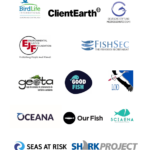
Joint NGO letter on including Russian seafood and fishing vessels in upcoming EU sanctions
September 13, 2022
In a joint NGO letter to the European Commission, we state that the EU must urgently ensure that its own fish populations are rebuilt to reduce the dependence on imports from uncooperative yet competitive, high IUU risk sources such as Russia. Immediate action needs to be taken, particularly on the most overfished stocks. Read the full letter here.
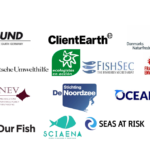
Joint NGO feedback to the European Commission on the Common Fisheries Policy’s state of play and orientations for 2023
August 23, 2022
We have provided a joint NGO response to the European Commission’s public consultation on the progress towards more sustainable fisheries, the state of fish stocks and the setting of fishing opportunities. The Common Fisheries Policy (CFP) regulation aims to make European fisheries economically, socially, and environmentally sustainable. However, the EU is still far from reaching its legal obligation of harvesting all stocks sustainably by 2020. Read more here.
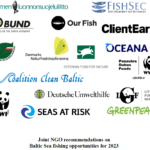
Joint NGO recommendations on Baltic Sea fishing opportunities for 2023
June 15, 2022
In October 2022, EU fisheries ministers will agree on fishing opportunities in the Baltic Sea for 2023. As the deadline to end overfishing by 2020 has passed, all fishing limits must be in line with sustainable exploitation rates. We have provided joint NGO recommendations on Baltic Sea fishing opportunities for 2023 in the context of environmental regulations, EU fisheries legislation, scientific advice on catch limits, and the sharing of stocks with third countries. Read the NGO briefing here.